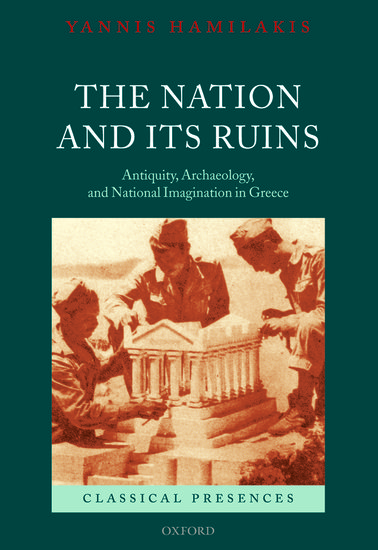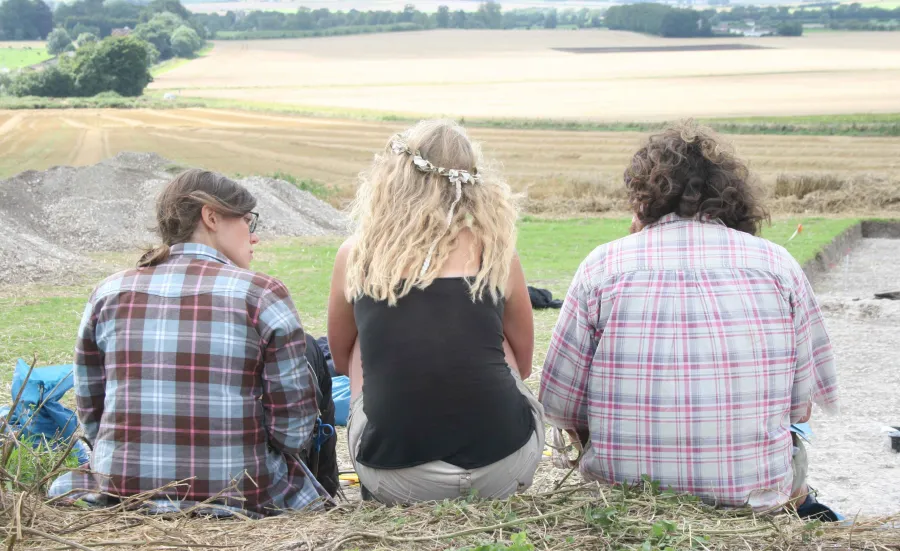The Nation and its Ruins Antiquity, Archaeology, and National Imagination in Greece
by Yannis Hamilakis

Yannis Hamilakis, Senior Lecturer in Archaeology, University of Southampton
About this book:
This innovative, extensively illustrated study examines how classical antiquities and archaeology contributed significantly to the production of the modern Greek nation and its national imagination.
It also shows how, in return, national imagination has created and shaped classical antiquities and archaeological practice from the nineteenth century to the present. Yannis Hamilakis covers a diverse range of topics, including the role of antiquities in the foundation of the Greek state in the nineteenth century, the Elgin marbles controversy, the role of archaeology under dictatorial regimes, the use of antiquities in the detention camps of the Greek civil war, and the discovery of the so-called tomb of Philip of Macedonia.
DOWNLOAD
"While all of the topics touched upon under the broad heading of “Antiquity, Archaeology, and the Invention of Modern Greece” are important and deserve the attention paid to them in the text, one issue in particular resonates with me as an American Classical archaeologist working in Greece.
That is the role that the major world powers played in the development of the concept of Hellenism, the archaeological repercussions of that role, and the legacy that has been left behind. In comparison to the discussion of indigenous Hellenism (112-119), which focuses primarily on the role of Christianity, the European and Western ideology of Hellenism is more resonant from my point-of-view. The examples are brief, and Hamilakis himself recognizes that this topic requires more attention. However, as a foreign archaeologist working in Greece today, bound by the restrictive permit regulations of the Greek government, this discussion provides insight into how and why the situation with foreign schools and permits developed. For example, when and how the French School received the Delphi permit, and how the Americans obtained the right to excavated the Athenian Agora (110).
This historical underpinning helps to frame the current situation that is frustrating for Greek and foreigner archaeologists alike."
by Yannis Hamilakis

Yannis Hamilakis, Senior Lecturer in Archaeology, University of Southampton
About this book:
- Winner of the 2009 Edmund Keeley Book Prize
- The first investigation of the production and use in Greece of the material, as opposed to the simply literary, classical past
- Explores a number of currently contested issues on the nature of national imagination, and the properties, agency, and power of materiality
This innovative, extensively illustrated study examines how classical antiquities and archaeology contributed significantly to the production of the modern Greek nation and its national imagination.
It also shows how, in return, national imagination has created and shaped classical antiquities and archaeological practice from the nineteenth century to the present. Yannis Hamilakis covers a diverse range of topics, including the role of antiquities in the foundation of the Greek state in the nineteenth century, the Elgin marbles controversy, the role of archaeology under dictatorial regimes, the use of antiquities in the detention camps of the Greek civil war, and the discovery of the so-called tomb of Philip of Macedonia.
DOWNLOAD
"While all of the topics touched upon under the broad heading of “Antiquity, Archaeology, and the Invention of Modern Greece” are important and deserve the attention paid to them in the text, one issue in particular resonates with me as an American Classical archaeologist working in Greece.
That is the role that the major world powers played in the development of the concept of Hellenism, the archaeological repercussions of that role, and the legacy that has been left behind. In comparison to the discussion of indigenous Hellenism (112-119), which focuses primarily on the role of Christianity, the European and Western ideology of Hellenism is more resonant from my point-of-view. The examples are brief, and Hamilakis himself recognizes that this topic requires more attention. However, as a foreign archaeologist working in Greece today, bound by the restrictive permit regulations of the Greek government, this discussion provides insight into how and why the situation with foreign schools and permits developed. For example, when and how the French School received the Delphi permit, and how the Americans obtained the right to excavated the Athenian Agora (110).
This historical underpinning helps to frame the current situation that is frustrating for Greek and foreigner archaeologists alike."


Comment